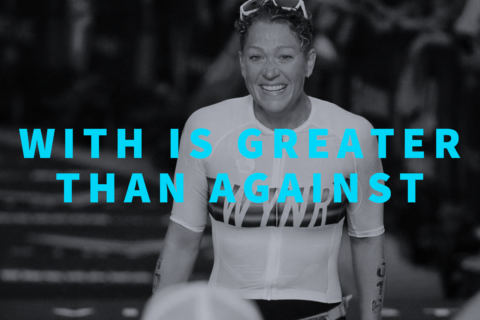Every athlete has a personal IZOF. Coach Grant Holicky shares the concept and explores how to determine your IZOF. Then he shares why knowing your IZOF is helpful and how you can recreate your IZOF on demand.
Video Transcript
Chris Case 00:09
Welcome to Fast Talk laboratories, your source for the science of endurance performance.
Chris Case 00:19
Welcome back to Fast Talk Labs Grant Holicky of forever endurance.
Grant Holicky 00:23
Hey, thanks for having me. It’s always great to be here.
Chris Case 00:25
Yeah. on a previous video, we talked about something called the individual zones of optimal functioning eyes off, we want to talk a little bit more about that today, explore what it is, and explore how you can figure out what yours is. Tell us tell us more. Yeah, so
What is IZOF?
Grant Holicky 00:41
this is a theory developed by Hannon in and the idea behind it is that every athlete has, and not just an athlete, any performer has an individual’s zone, an emotional state, if you will, of where they perform their very, very best. And, and there’s been a lot of studies done on say endurance sports, and what’s the best zone of functioning for that something like power sport or reaction, sport, anger might be a better situation for that. But then every athlete has their own situation. And while I may want to be at peace, that may not work for everybody. So what we want to do is talk you through a little bit of how to find your individual zone of optimal functioning, and and then use that to be your best when you perform.
Chris Case 01:26
Yeah, I’ve heard you explain before that you get to the the start line and you use humor, you use joy, you use these types of emotions to get prepared. Talk about that stepwise process for someone out there to find their own zone of optimal functioning,
Grant Holicky 01:43
Right and when I talk to athletes, what I find is that everybody wants to look at something like the Michael Phelps face, right? The Phelps before the Olympics, one year was sitting in there, and he was focused, he has headphones on look angry, and he was staring at another competitor. And as I, as athletes come to the sport, I see them try to mimic this very serious approach to the sport. And while that really may work for somebody like that, that may not work for another person, it doesn’t work at all. For me, it gets me way too wound up, I race more, because I really just like pushing myself. So I go to the line and I try to cultivate joy, I try to cultivate happiness, I try to cultivate those things, I still let all those nerves come, you know, I still let all those butterflies come, I still love the adrenaline flow. But I want to frame it in a place. That’s something that I really like this, I really like to do this. And and I’ve spent a lot of time trying to figure out what that is for me. And I’ve spent a lot of years failing at what that is, for me,
Chris Case 02:43
I bet it’s a trial and error type of situation.
Grant Holicky 02:45
And in a lot of ways it is. And essentially what it is, is you’re going to do a qualitative experiment on yourself. And what we’re going to, what I would ask you to do is think about your very, very best performances. Now that might be a workout. And one of the things that we find with a lot of athletes is they’re going to look back at their very greatest performance, some of those athletes are going to find that great performance in a workout. And that in and of itself might be a little bit telling, right? So find your very, very best performances, and then start to try to recall your frame of mind going into those performances. And during those performances, and I encourage you to write all that down. What were the emotions? What were the things that were happening in your life? Where were you were you in an unstable place in your life, were you an incredibly stable place in your life, and then start to go now, second, best performance, third, best performance, fourth best in performance, and start lining up the things that match.
Chris Case 03:41
Just to jump in here and clarify. You’re talking mainly about psychology here and not the training that gets you to that, right?
State of mind
Grant Holicky 03:48
Absolutely. So we’re trying to look at a mental state, we’re trying to look at what’s I incredibly anxious, was I incredibly confident, was a happy was a nervous was I scared was mad. Any of those things can have a real effect on how you perform and where you are in that moment. So coming up with a list that gives you those things and then starting to come up with the common denominators that that’s gonna start to have you develop your place of optimal functioning, your your best chance to perform, what emotional state you’re in, going into that.
Chris Case 04:23
Are there people, coaches, parents, spouses that can help you figure this out, or is it really up to you?
Grant Holicky 04:31
I think it’s really up to you. But I think there’s really you bring up a great point how do you find that objective approach to that and and most of the research on this has been done with asking athletes to write down their optimal emotional state and those times but I do think what you’re bringing up as an including a partner, including the training partner or coach, and say, Hey, you remember that race? You know, you remember that day that I won, whatever What was going on? What do you remember about that? Because I think what they’re going to tell you might not completely jive with what you remember. And now might be some really helpful information to.
Chris Case 05:10
Absolutely. Very good. Yeah. Thank you again, Grant Holicky.
Grant Holicky 05:14
Yeah, it’s always great to be here. I really love talking about this stuff.
Chris Case 05:17
Yeah. Join us on the forum for more of this topic, hit Grant up with some questions if you have them or explain how you found your individual zone of optimal functioning on the forum.
Grant Holicky 05:29
Yeah, and one of the great things about this is, like I said, before, everybody is going to be different. So sharing what yours is, is maybe going to help some other people find theirs, it might just be a place they hadn’t thought of before. So this, this community approach is really a great way for all of us to come up with our own individual zone of optimal function.
Chris Case 05:49
Great. Thank you.



